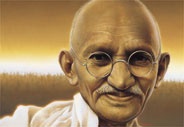 Today is Mahatma Gandhi's Birthday and the International Day of Non-Violence. Martin Luther King, Jr., described Ghandi as, "probably the first person in history to lift the love ethic of Jesus above mere interaction between individuals to a powerful and effective social force..."
Today is Mahatma Gandhi's Birthday and the International Day of Non-Violence. Martin Luther King, Jr., described Ghandi as, "probably the first person in history to lift the love ethic of Jesus above mere interaction between individuals to a powerful and effective social force...""I found," King observed, "in the nonviolent resistance philosophy of Gandhi... the only morally and practically sound method open to oppressed people in their struggle for freedom."
Gandhi
 led nationwide campaigns to ease poverty by increasing economic self-reliance, expand women's rights, and end untouchability. His primary political goal was independence from foreign control in India. In 1930 Gandhi famously led the "Non-Cooperation" movement that protested the British-imposed salt tax via a 240 mile Salt March.
led nationwide campaigns to ease poverty by increasing economic self-reliance, expand women's rights, and end untouchability. His primary political goal was independence from foreign control in India. In 1930 Gandhi famously led the "Non-Cooperation" movement that protested the British-imposed salt tax via a 240 mile Salt March."I have nothing new to say...the principles of truth and nonviolence are as old as the hills," Mohandas Karamchand "Mahatma" Gandhi once wrote.
In Ghandi's opinion, resisting evil, or "non-cooperation" as he often referred to it, was as fundamental as cooperation with good. But while "non-cooperation" had typically meant violence, Ghandi asserted that violent resistance only nourishes evil. Furthermore, that evil could only be sustained by violence. Accordingly, only the complete abstention from violence and embracing any penalty for non-co-operation are moral responses to evil.
"I became deeply fascinated by his campaigns of nonviolent resistance. As I delved deeper into the philosophy of Gandhi, my skepticism concerning the power of love gradually diminished, and I came to see for the first time its potency in the area of social reform. The 'turn-the-other-cheek' philosophy, and the 'love-your-enemies' philosophy, were only valid when individuals were in conflict with other individuals; when racial groups and nations were in conflict, a more realistic approach seemed necessary. But after reading Gandhi, I saw how utterly mistaken I was."
~Reverend Martin Luther King, Jr.
The honorific "Mahatma" means "Great Soul." Its use is credited to the late writer and Nobel Laureate Rabindranath Tagore, the first Asian awarded a Nobel prize.





Way cool, some valid points! I appreciate you making this article available, the rest of the site is also high quality. Have a fun. Gandhi cap
ReplyDelete